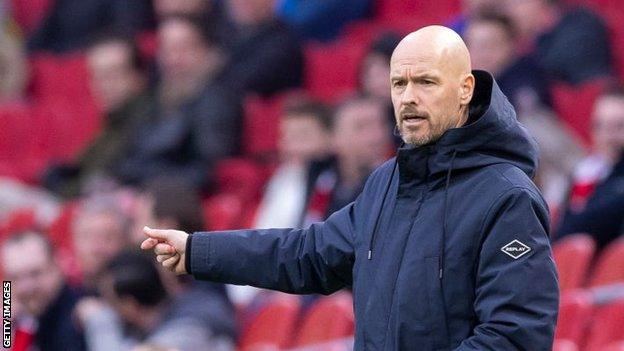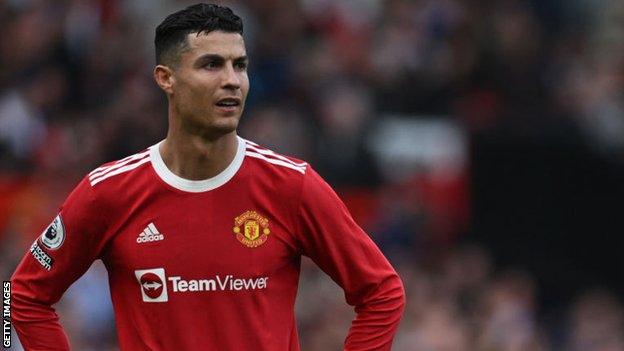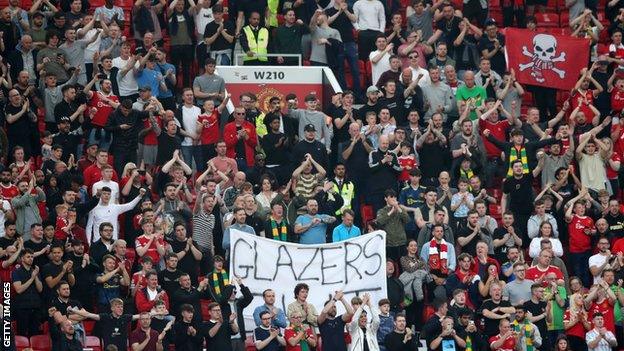Erik ten Hag: Manchester United's new boss and the challenges he faces
- Published

Ten Hag won two Eredivisie titles and two KNVB Cups with Ajax
Erik ten Hag has become Manchester United's fifth permanent manager since the retirement of Sir Alex Ferguson in 2013.
During the intervening years, there have been fleeting moments when it seemed the club was moving in a forward direction.
But, right here, right now, they are further away from challenging for major honours than they have been since Ferguson first arrived at the club in the mid 1980s.
In a sense, Ten Hag is in a good position. After what has gone before, under David Moyes, Louis van Gaal, Jose Mourinho and Ole Gunnar Solskjaer, there is a sense that structural issues are the real problem at Old Trafford and until they are sorted, any manager will find the job tough.
But this is also the 52-year-old's chance to prove he is capable of transitioning from highly rated coach of a famous club in a less competitive league, to one at the highest level of the game.
Clearly though, there are a number of challenges for Ten Hag to overcome.
He's like a chess player - fans on Erik ten Hag
Convince the sceptics
In what came down to a straight choice with Mauricio Pochettino, United felt Ten Hag's progressive style and willingness to work with a director of football was more in tune with what is now in place at Old Trafford.
Nevertheless, Ten Hag is stepping into an alien world.
Unlike Pochettino, he has never experienced the unique demands of English football, where energy-sapping game follows energy-sapping game, where success only increases the brutality of the schedule and where room for rest is virtually non-existent.
Ajax have had five domestic midweek matches so far. Even in a campaign where they experienced early exits in both the FA Cup and Carabao Cup, United will have at least seven this season.
In the three-week period when Ajax were enjoying their winter break, United had five games - and more called off because of Covid.
Evidently, the club's pre-season trip to Thailand - and a game against Liverpool - and Australia will be vital for Ten Hag to get his ideas across.
He needs the players to buy into his philosophy immediately as the chance of making up for lost time - at least until the World Cup when most of his players will be on international duty anyway - will be limited.
How to solve a problem like Ronaldo?

Ronaldo has scored 15 Premier League goals this season, including a hat-trick against Norwich on Saturday
Cristiano Ronaldo's enormous salary and superstardom are a magnet for attention.
The Portuguese has scored 21 goals for United this season, but unless Ten Hag finds a consistently productive way of using the 37-year-old, five-time world player of the year, or gets rid of him completely, progress will be difficult.
Either through the clear physical limitations that prevent United operating a forceful and repeated high press or the frosty relationship that has developed with Harry Maguire over the club captaincy, Ronaldo's presence is an issue for Ten Hag.
The Dutchman has never managed anyone with either the history or the ego of Ronaldo. It is essential he gets this right.
Contracts and futures
It is not that hard to come up with a list of 10 United players who could leave this summer.
Paul Pogba, Jesse Lingard, Edinson Cavani and Juan Mata are all out of contract. Phil Jones' runs to 2023 but he has played just twice in more than two years.
Then there is goalkeeper Dean Henderson, central defender Eric Bailly and England forward Marcus Rashford, who have been the subject of intense speculation over their Old Trafford future.
Anthony Martial, Donny van de Beek and Brandon Williams were all out of favour when they were loaned out to Sevilla, Everton and Norwich respectively.
Amad Diallo has done nothing in his loan spell at Rangers to suggest he is a United first-team player, while Mason Greenwood remains unavailable for selection.
Even if not all the named players end up leaving, there are going to be sizeable holes to fill although Patrick Vieira used a similar lack of resource to dramatically improve Crystal Palace last summer.
Finding the right quality at United may not be quite so easy.
Meeting expectations

Manchester United have not won a major trophy since the Europa League in 2017
On the face of it, finishing in the top four and winning a domestic cup would represent an excellent return for United in Ten Hag's first season.
United have won nothing since their 2017 Europa League success under Mourinho - their longest period without silverware since the barren spell between 1977 and 1983.
If, as expected, they fail to finish in the top four this season, next term will be the fourth time out of nine they have not been involved in the Champions League.
Correcting these statistics is one of the reasons why some argue Ten Hag needs to be given time to implement his ideas and bring about tangible improvement at a club for whom winning used to be second nature.
But this is Manchester United. The noise around Old Trafford is immense. Ten Hag needs early results to prove he is the right man for the job.
Four games without a win tends to lead to talk of a crisis and that will not change. Time will only be granted externally with positive performances.
Recruitment is key
It is clear United's recruitment - bolstered significantly in the final years of Ed Woodward's time as executive vice-chairman - is a major issue.
Quite aside from Ronaldo's arrival, which came after Solskjaer had spent months persuading Cavani to stay at the club for an extra year to be the major attacking focal point - there are the contracts for the likes of Bailly and Jones.
These were handed out, seemingly, for no logical reason other than to try and earn a transfer fee for players who evidently had no long-term future at Old Trafford.
Few recent purchases have impressed and those who did initially, like Maguire and Aaron Wan-Bissaka, regressed to the extent of losing their place in the side in the latter's case, and face widespread calls to be dropped in the former.
Interim boss Ralf Rangnick has highlighted the continuity that has helped make Manchester City and Liverpool.
It was accepted even before this sorry season unfolded that United needed a defensive midfielder and that remains the case.
Somehow, despite committing over £180m on Maguire, Raphael Varane, Victor Lindelof and Bailly since 2016, United are still weak in central defence.
They also need a world-class striker - and much more from the players they already have.